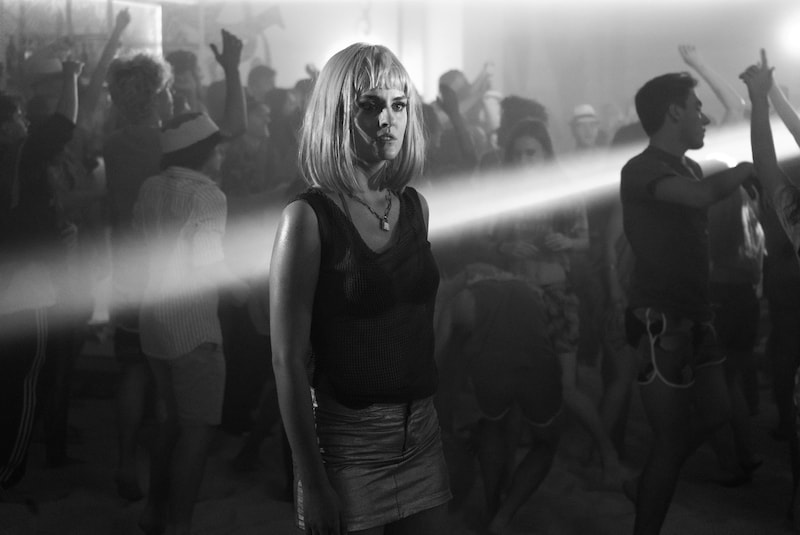
Paris, 13th District (Les Olympiades) tells the intertwining stories of four thirty-something adults in Paris. Scratch below the sometimes overbearing stylization and you will find a film that distills the beauty of randomness — the allure of the chance encounter and the relationships that come, go, and reemerge along the way.
Directed by Jacques Audiard (Rust and Bone, A Prophet), who co-wrote the script with filmmakers Céline Sciamma (Portrait of a Lady on Fire) and Léa Mysius (Ava), it begins with Camille (Makita Samba) knocking on the door of Émilie (Lucie Zhang), who is looking for someone to sublet a room in her dying grandmother’s apartment, where she lives rent-free.
At first glance, Émilie rejects Camille, expecting him to be a woman. But they begin talking and strike up a rapport. Soon, they are having sex, and Camille agrees to move in. They become friends with benefits. He eventually wants to end it. She falls in unsaid (and unrequited) love. Things get messy and he moves out. Their friendship takes a pause.
Such is the nature of sex in Paris, 13th District. There’s a lot of it. But it is not the kind of promiscuous, carefree sex one might expect from a film about a group of young city dwellers. There’s some of that. Yet beneath it all lays a range of intense emotions each protagonist experiences as they search for companionship.
We soon meet Nora (Noémie Merlant), a new law student, viewed by her twenty-something classmates as old. In her struggle to fit in, she agrees to attend a rave. She wears a blonde wig and is mistaken for a cam girl named Amber Sweet (Jehnny Beth). A video of Nora at the rave goes viral and her classmates think she is the cam girl. Friendless, the humiliation eventually leads Nora to drop out of school. She interviews for a job at a real estate agency managed by Camille. She gets the gig, and their professional relationship slowly evolves into a romantic one.
At the same time, Nora begins paying to chat with Amber Sweet via webcam. Their merchant-consumer relationship becomes a genuine friendship, and later something more. They begin talking outside Amber’s service platform, sometimes falling asleep with their webcams on. Camille and Émilie restart their friendship. Émilie, she shares, has been hitting the dating apps, preferring the casual hook-up to anything serious.
Once one feels their way through the vignettes Audiard weaves together on screen, one finds a tale that captures the porous nature of relationships. Lovers become friends, coworkers turn into romantic partners, and someone paid for their time might end up a trusted confidant and companion. Relationships come and go, bonds endure.
The protagonists struggle to navigate the physical and the digital, two synchronous worlds increasingly becoming one. The film begins with a physical encounter that ends in separation. Only when Camille and Émilie bond over her exploits on the dating apps does their friendship resume. Nora’s story begins with a traumatic event in the digital space. This leads to a virtual (and later physical) relationship with Amber, the only true companionship she finds. We are just as likely to meet our next partner in our apartment building or at the office as we are via a dating app or webcam service.
Paris, 13th District is a love story, depicting the ways conventional pursuits of love, if they ever existed to begin with, continue to unravel and evolve in contemporary life. Young lovers are faced with the dichotomy of the digital: unfettered access sometimes makes the search harder and more lonely. But thankfully, the film acknowledges this reality without cliché or condescension. At times, the digital preserves, saves, and creates relationships, too. The nature of romance and heartbreak is ever-changing, even in Paris.
The film takes its inspiration from a series of comics by Adrian Tomine. And there’s a Frances Ha–like quality to it. The characters navigate a stressful, urban environment only to realize that the struggle itself is common, inevitable, and at times necessary. Yet the world of Paris, 13th District appears more cynical and cold. The charm of the city feels diminished. The black and white cinematography of Paul Guilhaume strips it bare as the camera follows the protagonists trying to make a life for themselves in the streets and apartments of Paris.
The film’s stylization captures the intended affect, but there are times when it feels like a cover for incomplete storytelling. There are moments of intense emotional struggle in the film — Émilie’s relationship with her grandmother, for example — that are introduced but left wanting. Only so much can be explored in 106 minutes, and such underdeveloped tributaries leave the film occasionally unfocused.
Once settled into the story on screen, viewers will experience the endless empathy Paris, 13th District extends to its characters. It pours out of the screen. The characters make mistakes. They say horrible things. They turn on one another. But such moments are all a part of being young. We are all byproducts in one way or another of the world we come to inhabit. Sometimes, it sucks. Other times, it is what brings us together. And it can be a pretty cool thing, at least once once we start to figure it all out.
Paris, 13th District opens in theaters via IFC Films on April 15th.
Related Topics: Celine Sciamma, Jacques Audiard

